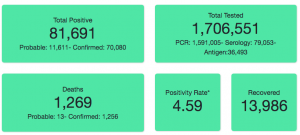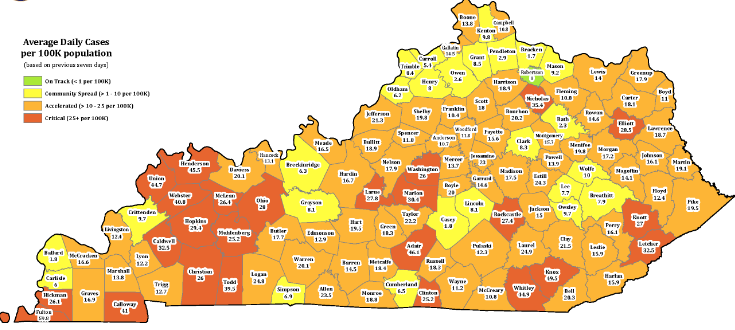Gov. Andy Beshear on Tuesday reported 776 new COVID-19 cases and 14 deaths, bringing the state’s totals to 81,691 cases and 1,219 deaths. One hundred and eleven of the newly reported cases were from children up to age 18, of which 22 were age 5 and under. The youngest was just 1 month old.
Boone County reported 14 cases, Kenton County 13 and Campbell County 11.
“We’re going to watch this trend through this week because we’ve been on this escalation and we want to watch to see if we are seeing any stabilization,” Beshear said.
The deaths reported Tuesday include a 76-year-old man from Daviess County; an 88-year-old man from Fayette County; two women, ages 74 and 87, and three men, ages 82, 88 and 82, from Henderson County; an 87-year-old man from Jessamine County; a 96-year-old man from Jefferson County; 91-year-old woman from Laurel County; two woman, ages, 68 and 95, from Madison County; a 59-year-old woman from McLean County; and a 90-year-old man from Montgomery County.
“The tough part about today’s report is we’ve lost 14 additional Kentuckians,” the Governor said. “It’s a big number, and these days are hard when we’ve had this amount of loss.”
As of Tuesday, there have been at least 1,706,551 coronavirus tests performed in Kentucky. The positivity rate was 4.59 percent, and at least 13,986 Kentuckians have recovered from the virus.

For additional information, including up-to-date lists of positive cases and deaths, as well as breakdowns of coronavirus infections by county, race and ethnicity, click here.
Beshear continues to conduct news conferences remotely as he and his family quarantine in the Governor’s Mansion after they were potentially exposed to COVID-19 late Saturday afternoon through a member of the Governor’s security detail.
“We are striving to have a positive attitude, given that really so little is being asked of us. And if it prevents others from being exposed to this virus, we are more than willing to do it,” the Governor said.
The Beshear family will be tested regularly and will remain in quarantine until cleared by the Kentucky Department for Public Health (DPH).
“My entire family tested negative today,” Beshear said. “We know it can take a while for the virus to manifest, and so we will be tested – I believe on Friday – again, but that was at least good to see.”
Fast at 4
Beshear highlighted a variety of issues of importance to Kentuckians and the Commonwealth.
Transportation Improvements
Beshear and other state leaders announced $8.5 million in transportation funding to replace about 170 buses and support other efforts to expand reliable and sustainable transportation in Kentucky.
The funding will go toward the purchase of cleaner emission transit buses in areas of Kentucky challenged with meeting federal air quality standards.
The funds are part of the $20.3 million awarded to Kentucky under the Volkswagen Environmental Mitigation Trust. That was part of $100 million secured by then-Attorney General Beshear after filing suit against the automaker for deceiving Kentucky consumers.

Gov. Andy Beshear, speaking from quarantine in the Governor’s Mansion.
“We held Volkswagen accountable for deceiving consumers and now we are using those funds to build a better Kentucky with safe, reliable transportation to help Kentuckians get to work, to the doctor and to the grocery store,” said Beshear. “This funding will reduce pollution to create cleaner air and improve transportation options in four regions of the Commonwealth.”
Supporting Recovery Centers
The Governor announced $2.8 million for 14 Recovery Kentucky centers across the Commonwealth to help ensure safe, stable housing for those recovering from substance use disorder.
Through Community Development Block Grant CARES Act funding, each center will be eligible for approximately $200,000 to offset costs incurred due to the coronavirus. Funds also help ensure centers can continue services while protecting residents and staff from COVID-19.
“Everyone should have access to safe, stable housing,” said Beshear. “As Kentuckians recover from substance use disorders, we must ensure their safety and well-being, especially during this pandemic.”
Early Voting Begins
Tuesday marked the beginning of early voting in Kentucky ahead of the Nov. 3 General Election. Beshear continues to encourage all eligible voters to make a plan to cast a ballot, either by sending in a previously requested absentee ballot, voting early in person or in person on the day of the election.
“Remember, there are three weeks to vote early, before Election Day, and there are even Saturday hours,” the Governor said. “Pick a time. Make a plan of when you’re going to go vote.”
See the NKyTribune’s Election Guide here.
Mask Up Kentucky!
Beshear also stressed the continued importance of everyone wearing face coverings, calling it the single most important thing all of us can do to fight COVID-19.

“This is our greatest and most important tool for getting back to everything we want to do,” the Governor said. “Do the right thing: Mask up.”
He also encouraged Kentuckians to spread the word on social media using #MaskUpKY and #MaskUpKentucky hashtags. The Governor also highlighted a new contest: Kentuckians who use the hashtags will receive a #TeamKY mask if their post is featured as part of the Governor’s daily 4 p.m. news conference.
Back to School Update
Lt. Gov. Jacqueline Coleman spoke about the K-12 school COVID-19 self-reported data dashboard, which went live Sept. 29.
“The dashboard provides an opportunity for school districts, local health departments and health care providers to work together for a safe return to in-person classes for every child,” she said. “Each community has actionable information that helps keep Kentucky open for business and on a path to a sustained return to in-person classes – which is what we all want for our kids.”
Coleman, who also serves as Secretary of the Kentucky Education and Workforce Development Cabinet, noted that all schools are required to report positive COVID-19 cases each weekday. Local health departments collect this information and transmit it to the Kentucky Department for Public Health (KDPH), where it goes through a verification process.
“All of this data can be found for your school, your community, and the entire commonwealth at kycovid19.ky.gov,” she said.
The Lieutenant Governor said that currently there are 1,732 schools in the database. At last report, there were nearly 800 students and more than 130 students in quarantine. Unfortunately, she also said more than 200 schools have failed to provide the required information.
“That is unacceptable and irresponsible,” Coleman said. “It jeopardizes the health of your students, school staff, their families and your community.”
She encouraged all districts to make the reporting a top priority.
Dr. Stack Update
Dr. Steven Stack, KDPH commissioner, provided more detailed information Tuesday on the state of the coronavirus in the Commonwealth.
He pointed to the latest monthly report on Kentucky provided by the White House, which is posted on kycovid.ky.gov, that shows the coronavirus worsening across most of the Commonwealth. It assigns each county a color – green, yellow, orange or red – depending on the incidence rate.

“If you look where the red is, the red is a lot more common in the rural communities now,” Stack said. “And there are many more red counties than there were in the weeks prior.”
Stack also said that beginning next week, Kentucky will change the way it calculates the positivity rate. He said that going forward, Kentucky will use COVID-19 PCR tests that are sent in electronically to make the calculation.
“PCR tests are the gold standard – those are the most reliable – for finding active disease in currently infected people,” Stack said. “More than nine in 10 of our tests are PCR tests. So we are only going to look at the PCR tests. They are the most accurate and are far and away the largest proportion of the tests.”
Stack went into great detail about the change and said there were four main benefits to moving to using the PCR tests to calculate the positivity rate: automated collection of data, a more stable data stream, filter for the past seven days and a quick turnaround on testing results.
Beshear emphasized that the change will not take place until next week to give everyone – hospitals, state officials, media and citizens – enough time to analyze and ask questions about the move before it happens.
















